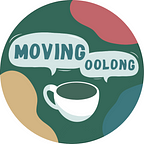From Representation to Rallies: Literature Recommendations
Hello! If you’re just tuning in, we’re Sally, Ming, and Linda — hosts of the Moving Oolong Podcast, where we share personal and hopefully relatable stories and dreams as Asian American best friends in our early twenties.
In Episode 60, we talked with Vinh Dang, Communications Director for the East Coast Asian American Student Union. In addition to sharing how to get involved in community organizing and analyzing boba liberalism, Vinh also provided a reading list for learning critical consciousness, and Asian American identity.
Origins: An Immigrant’s Journey in America by Thy Nguyen
What is it like to live as an Asian woman in America?
Through short stories, essays, and poems, the author shares the intimate details of her initial journey as an immigrant at the age of twelve from Vietnam to the United States, as well as the fun, and often confusing, events she experienced.
Police: A Field Guide by David Correia and Tyler Wall
Police: A Field Guide is an illustrated handbook to the methods, mythologies, and history that animate today’s police. It is a survival manual for encounters with cops and police logic, whether it arrives in the shape of officer friendly, Tasers, curfews, non-compliance, or reformist discourses about so-called bad apples. In a series of short chapters, each focusing on a single term, such as the beat, order, badge, throw-down weapon, and much more, authors David Correia and Tyler Wall present a guide that reinvents and demystifies the language of policing in order to better prepare activists — and anyone with an open mind — on one of the key issues of our time: police brutality. In doing so, they begin to chart a future free of this violence — and of police.
Minor Feelings: An Asian American Reckoning by Cathy Park Hong
Poet and essayist Cathy Park Hong blends memoir, cultural criticism, and history to expose the truth of racialized consciousness in America. Binding these essays together is Hong’s theory of “minor feelings.”
As the daughter of Korean immigrants, Cathy Park Hong grew up steeped in shame, suspicion, and melancholy. She would later understand that these “minor feelings” occur when American optimism contradicts your own reality — when you believe the lies you’re told about your own racial identity.
Hong uses her own story as a portal into a deeper examination of racial consciousness in America today. This book traces her relationship to the English language, to shame and depression, to poetry and artmaking, and to family and female friendship in a search to both uncover and speak the truth.
No No Boy by John Okada
No-No Boy tells the story of Ichiro Yamada, a fictional version of the real-life “no-no boys.” Yamada answered “no” twice in a compulsory government questionnaire as to whether he would serve in the armed forces and swear loyalty to the United States. Unwilling to pledge himself to the country that interned him and his family, Ichiro earns two years in prison and the hostility of his family and community when he returns home to Seattle. As Ozeki writes, Ichiro’s “obsessive, tormented” voice subverts Japanese postwar “model-minority” stereotypes, showing a fractured community and one man’s “threnody of guilt, rage, and blame as he tries to negotiate his reentry into a shattered world.”
The Best We Could Do by Thi Bui
This illustrated memoir is about the search for a better future and a longing for the past. Exploring the anguish of immigration and the lasting effects that displacement has on a child and her family, Bui documents the story of her family’s daring escape after the fall of South Vietnam in the 1970s, and the difficulties they faced building new lives for themselves.
At the heart of Bui’s story is a universal struggle: While adjusting to life as a first-time mother, she ultimately discovers what it means to be a parent — the endless sacrifices, the unnoticed gestures, and the depths of unspoken love. Despite how impossible it seems to take on the simultaneous roles of both parent and child, Bui pushes through.
Good Talk by Mira Jacob
Like many six-year-olds, Mira Jacob’s half-Jewish, half-Indian son, Z, has questions about everything. At first they are innocuous enough, but as tensions from the 2016 election spread from the media into his own family, they become much, much more complicated. Trying to answer him honestly, Mira has to think back to where she’s gotten her own answers: her most formative conversations about race, color, sexuality, and, of course, love.
Poetry as Offering: To Practice In Poetry & Live In The Body-Mind by Kay Ulanday Barrett
“…Poetry is both cultural and political strategy, a way to carve praxis as a cultural engagement where my migrant domestic worker ma, my strange and precarious young queer brown scholarship ways, Trans Justice organizer, as Disability Justice advocate, can carve out wholeness in ways that are impossible in other fields and crafts.”
i hope we choose love: notes on the application of justice by Kai Cheng Thom
“i do not have much faith in justice, but i have no choice but to believe in it. the other option is nihilism — total lack of faith in humanity — which i refuse. i think we must refuse nihilism because that way lies fascism. i think we must refuse despair and embrace healing, slow and imperfect though it may be. i am trying to embrace my own healing. i am trying to embrace my own painful, wounded life. as adrienne maree brown suggests, i am trying to embrace growth and constant transformation, like a flower growing in the poisonous radiation.”
Decolonize Through 30 Day Poetry Challenge
Babaylan Studies shares a process of re-membering/ decolonization reflection, release, healing and radical visioning.
These works of poetry, literature, and art highlight a deeper understanding of identity and justice. We hope you find a piece that speaks to you.
